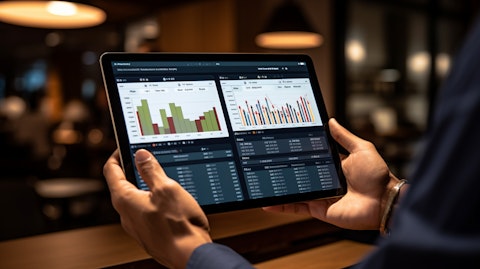In this article, we will discuss: What Is Short Selling In The Stock Market? 15 Stocks Hedge Funds are Shorting.
Short selling, also known as shorting or going short, is a trading method in which assets are borrowed and subsequently sold in order to profit from the stock’s decline in price. Investors borrow securities from brokers and sell them on the open market to carry out a short sale. The investor can purchase the asset back at a reduced price, return it to the broker, and keep the difference as profit if the price of the security drops. If the price increases, the investor will have to pay more for the security and will suffer a loss. Hedge funds and institutional investors make the majority of conventional short sales or bets that a stock price will drop to protect their interests from falling stock prices or to speculate that shares are overpriced. On the other hand, activist short sellers investigate companies to identify targets they claim have questionable accounting or business procedures, distribute information (often in secret), and, if all goes according to plan, drive down the share price. Columbia University law professor Joshua Mitts’ 2019 research, Short and Distort, discovered more than $20 billion in stock mispricing related to hundreds of anonymous attacks on public businesses between 2010 and 2017.
The S&P 500 has increased by 15% so far this year, which is indicative of a strong market performance. As a result, short sellers for the 500 companies in the index have faced difficulties and possible losses rather than being in the winners’ circle. The amount of short interest in an average S&P 500 member is at its lowest point in almost twenty years, according to Goldman Sachs Group Inc. HFR statistics stated assets in funds with a short bias fell to $4.6 billion from $7.8 billion in 2008, during a time when the total size of equity hedge funds almost tripled in size. In the US, the Securities and Exchange Commission (SEC) regulates short selling to guard against misuse and ensure that it continues to benefit the market during sharp declines in stock prices.
In 2023, the SEC adopted new regulations to promote transparency in short-selling, mandating investors to record short positions and companies to submit records of share lending activity to FINRA, a self-regulatory body that polices brokers. In the aftermath of the Video Game Retailer controversy, short sellers had lost over $6 billion, according to analytics company S3 Partners, as a result of retail investors pushing up the stock price. Hence, short selling came under renewed congressional scrutiny in 2021.
However, hedge funds represented by the Managed Funds Association stated that the restrictions may disclose investors’ methods. “Investment advisers will face more risk when selling short, which will harm investors, market participants, and market efficiency,” Bryan Corbett, its chief executive officer, warned.
Despite the challenges that short sellers face, there are several advantages to short selling for both the economy and the capital markets. Research from both theoretical and empirical perspectives has demonstrated that short selling improves price efficiency, liquidity, and corporate governance, hence improving the overall state of the market.
According to statistics from S3 Partners, the Commercial Banking Company’s failure made it the most successful short bet of the year, producing paper profits of $1.6 billion. In second place was the Pharmaceutical and Biotechnology Company, a maker of vaccines, which fell 45% in 2023. Short sellers, who bet on the stock’s collapse, made $1.1 billion from this company.
However, short sellers faced significant losses by betting on mega-cap technology businesses, which rose in 2023 and drove a wide comeback in stocks. The E-Mobility King caused the greatest agony for short sellers, incurring $12.2 billion in paper losses in 2023 as the electric car maker’s price almost doubled. AI Chipmaker, which lost $11.2 billion to bearish traders, was next on the list, which included the majority of the so-called Magnificent Seven, semiconductor giants, and Coinbase, as bitcoin rebounded. The previous year was brutal for the market. As per S3 Partners’ research, short sellers on Wall Street have lost around $195 billion so far this year, which almost balances out the nearly $300 billion in gains they experienced during the 2022 market crisis. In total, the group lost $242 billion in 2020 and around $142 billion in 2021. Although short selling carries risk, investors may be able to lower this risk and make profits by keeping an eye on equities that hedge funds are shorting.
With that said, here are the 15 Stocks That Hedge Funds Are Shorting.

A hand holding a tablet revealing a financial dashboard of assets and stocks.
Methodology:
For our list of stocks that hedge funds are shorting, we picked stocks with institutional ownership (which also includes hedge funds) of over 40% and float shorted over 30%. We curated our list based on institutional-ownership percentage.
Why are we interested in the stocks that hedge funds pile into? The reason is simple: our research has shown that we can outperform the market by imitating the top stock picks of the best hedge funds. Our quarterly newsletter’s strategy selects 14 small-cap and large-cap stocks every quarter and has returned 275% since May 2014, beating its benchmark by 150 percentage points. (see more details here)
15. Enovix Corporation (NASDAQ:ENVX)
% of Institutional Ownership: 49.23%
Float Shorted: 31.29%
Enovix Corporation designs, develops, and produces lithium-ion batteries. Enovix Corporation (NASDAQ:ENVX)’s has a float short of 31.39% as of June 20.
Enovix Corporation reported revenues of $5.3 million, up from $21,000 in Q1 2023, due to the company’s strong performance in IoT battery sales. However, bearish sentiment is present about Enovix (NASDAQ: ENVX) since the cash burn exceeded the analyst’s projection, raising possible questions about the company’s financial sustainability.
The company’s cash reserves fell significantly from an all-time high of $409.2 million in Q2 2023 to $306.8 million in Q4 2023 and $262.4 million in this quarter. In an effort to cut cash burn by $35 million, Enovix has reduced its workforce and laid off hourly factory workers. Enovix announced a $10 million negative gross profit and a $60 net loss in terms of revenue in Q4 2023. A high level of short interest has continued since late 2023, and it may rise higher because of concerns about the company’s dwindling cash reserves and questionable future profitability. The business also projects seasonally low revenue of $3.0 million to $4.0 million for the second quarter of 2024.
At the end of the first quarter of 2024, 18 hedge funds monitored by Insider Monkey reported having shares in Enovix Corporation (NASDAQ:ENVX), a decrease from 25 in the previous quarter. With 5,618,601 shares valued at $45 million, Jos Shaver’s Electron Capital Partners was the company’s largest shareholder in the first quarter.
14. Maxeon Solar Technologies, Ltd. (NASDAQ:MAXN)
% of Institutional Ownership: 52.63%
Float Shorted: 45.95%
Maxeon Solar Technologies, Ltd. (NASDAQ:MAXN) is a global manufacturer, marketer, and retailer of solar panels and related solar system components. Maxeon Solar Technologies’s hedge funds are shorting 45.95%, and it has 52.63% institutional ownership as of June 20.
In Q1 2024, Maxeon Solar Technologies disclosed revenues of $187 million, which was down from $318.3 million in Q1 2023. The company attributed this decline to challenging market circumstances, increased borrowing rates, and demand-affecting regulatory changes. Maxeon has seen its stock drop by more than 84% over the year, whereas the S&P 500’s gain was more than 15% as of June 21.
Maxeon shares fell after the manufacturer issued a ‘going concern’ warning and announced that TCL Zhonghuan Renewable Energy Technologies, the company’s main stakeholder, has committed to investing $100 million in stock and $97.5 million in debt, resulting in a significant dilution of shares. The issues facing Maxeon are related to the US solar industry as a whole, which is experiencing delayed installations due to new California housing incentives, high financing rates, and global competition. The company has suffered as panel costs in the US rooftop solar market have fallen to as low as 10 cents per watt, from about 40 cents over a year ago, as per analyst Pol Lezcano.
Hence, the general consensus among analysts on Maxeon Solar Technologies, Ltd. (NASDAQ:MAXN) is “Moderate Sell.” Over the past three months, seven Wall Street analysts have set 12-month price targets for Maxeon, with an average of $2.17 and a possible upside of 110.68%. The targets range from $5 to $0.50.
Maxeon Solar Technologies, Ltd. (NASDAQ:MAXN) was owned by 14 elite managers as of the end of Q1 FY2024, up from 12 hedge funds, according to Insider Monkey’s monitoring. Graham Capital Management, managed by Kenneth Tropin, is the company’s top shareholder, owning 5,628,400 shares valued at $18.74 million.
13. Arbor Realty Trust, Inc. (NYSE:ABR)
% of Institutional Ownership: 61.76%
Float Shorted: 39.28%
Arbor Realty Trust, Inc. owns a diverse portfolio of structured financing assets in the multifamily, single-family rental, and commercial real estate sectors in the United States. Arbor Realty Trust’s hedge funds are shorting 31.55%, and it has 62.38% institutional ownership as of June 20.
Q1 2024 GAAP net income for Arbor Realty Trust was $57.9 million ($0.31 per share), down from Q1 2023’s $84.3 million. This decline was mainly caused by reduced sales from the company’s agency business, which brought in $66.6 million as opposed to $96.3 million in the previous year. In spite of this, $96.7 million in distributable earnings ($0.47 per share) represented strong results.
The company has demonstrated its financial stability with a 9% rise in its loan servicing portfolio to $31.38 billion and strong liquidity, with $800 million in cash and $600 million in restricted cash. A steady dividend payment ratio of 91%, strategic stock repurchases at a discount, and an expanding loan servicing portfolio that demonstrates investor trust are some of Arbor’s strengths.
At the end of the first quarter of 2024, 24 hedge funds monitored by Insider Monkey reported having shares in Arbor Realty Trust, Inc. (NYSE:ABR), up from 17 the previous quarter. With 3,170,000 shares valued at $42 million, Christopher R. Hansen’s Valiant Capital was the company’s largest shareholder in the first quarter.
12. Vital Energy, Inc. (NYSE:VTLE)
% of Institutional Ownership: 62.38%
Float Shorted: 31.55%
The US-based independent energy business Vital Energy, Inc. is involved in the purchase, investigation, and development of oil and gas resources in the Permian Basin of West Texas. Vital Energy’s hedge funds are shorting 31.55%, and it has 62.38% institutional ownership as of June 20.
Revenue for Vital Energy’s first quarter of 2024 soared to $482.3 million from $332.5 million in Q1 2023, exceeding analysts’ expectations of $454.97 million. The business generated adjusted net income of $68.1 million and operational cash flows of $158.6 million, However, higher operational expenses of $9.30 per BOE on recently purchased Delaware Basin assets have resulted in increased spending on chemicals and water disposal.
As of the end of Q1 FY2024, Insider Monkey monitored that 32 hedge funds out of the 920 hedge funds held a position in Vital Energy, Inc. (NYSE:VTLE), up from 29 hedge funds. Sameer Sethna’s Aventail Capital Group is the largest stakeholder in the company, with 700,000 shares worth $36.78 million.
11. Altimmune, Inc. (NASDAQ:ALT)
% of Institutional Ownership: 62.72%
Float Shorted: 33.37%
Altimmune, Inc., a clinical-stage biopharmaceutical business, specializes in researching medicines for obesity and liver diseases. Altimmune has a float short of 33.37% as of June 20.
Revenue for Altimmune, Inc. dropped to $5 million in Q1FY 2024 from $21 million in the same quarter the previous year. The main cause of the revenue decline was an increase in research and development costs, which increased to $21.5 million from $17.2 million during the same time in 2023. The spike in R&D expenditure was primarily driven by $13.5 million in direct expenditures associated with the development of Pemvidutide (a novel, investigational, peptide-based GLP-1/glucagon dual receptor agonist in development for the treatment of obesity and MASH). In addition, the business paid $1.0 million for the winding down and termination of its HepTcell initiative. The three-month net loss in terms of revenue in the quarter was $24.4 million, as opposed to the same time in 2023 when it was $20.1 million.
19 hedge funds that Insider Monkey tracks reported owning shares in Altimmune, Inc. (NASDAQ:ALT) at the end of the first quarter of 2024, in line with 19 in the previous quarter. Peter Rathjens, Bruce Clarke And John Campbell’s Arrowstreet Capital were the company’s largest stakeholders in Q1.
10. Cutera, Inc. (NASDAQ:CUTR)
% of Institutional Ownership: 66.30%
Float Shorted: 38.47%
Among the stocks hedge funds are shorting is Cutera, Inc. (NASDAQ:CUTR) which offers dermatological and cosmetic solutions to medical professionals throughout the globe. Cutera has a float short of 38.47%, and it has 66.30% institutional ownership as of June 20.
In its first-quarter 2024 financial report, Cutera, Inc. (Nasdaq: CUTR) revealed consolidated revenue of $38.8 million, a 29% decline from Q1 2023. The company reported a significant sequential rise in AviClear revenue, which was primarily caused by a shift in the North American business model and the successful launch of an international limited commercial release. The company projected $160 million to $170 million in sales for 2024 and predicted a lower-than-expected $55 million to $60 million in cash and cash equivalents at the end of the year. The effective introduction of new products like xeo+ and programs like Cutera Academy, which seek to improve customer service and increase worldwide market presence, are among the company’s key strengths.
According to Insider Monkey’s Q1 FY2024 data, 11 hedge funds were long on Cutera, Inc. (NASDAQ:CUTR) at the end of the quarter, which decreased from 20 funds in the prior quarter. Glenn Russell Dubin’s Highbridge Capital Management is the largest stakeholder in the company, with 32.69 million shares worth $13.36 million.
9. Guess?, Inc. (NYSE:GES)
% of Institutional Ownership: 71.24%
Float Shorted: 33.23%
Guess Inc. creates, manufactures, distributes, and licenses lifestyle clothing and accessory collections for men, women, and children. Guess?, Inc. (NYSE:GES) is one of the stocks whose float short is 33.23% as of June 20. This 33.23% probably also includes other investment firms like mutual funds, and maybe individual investors as well, in addition to hedge funds.
Guess?, Inc. announced $592 million in first-quarter revenue for fiscal 2025, up 7% in constant currency and 4% in US dollars. The company attributed this growth to outstanding outcomes in licensing and America’s wholesale and strong results in Europe and Asia. Most importantly, Guess concluded the $57.1 million acquisition of Rag & Bone and integrated it into its operations.
However, GAAP operating margin declined 3.2% to negative 3.4% in the first quarter of fiscal 2025 from negative 0.2% in the corresponding quarter of the previous year. This decline was mostly caused by increased costs, such as transaction costs and separation charges, as well as the negative impact of currency, which was only partially countered by the positive effects of increased revenues and initial price hikes. Though weaker consumer traffic has resulted in flat revenues in the Americas retail division, the business projects 10.7%-12.7% revenue growth for fiscal 2025.
As of the end of Q1 FY2024, Insider Monkey monitored that 18 hedge funds out of the 920 hedge funds held a position in Guess?, Inc. (NYSE:GES), up from 16 hedge funds in the previous quarter. Paul Marshall And Ian Wace’s Marshall Wace LLP is the largest stakeholder in the company, with 1,146,853 shares worth $36.09 million.
8. Medical Properties Trust, Inc. (NYSE:MPW)
% of Institutional Ownership: 73.52%
Float Shorted: 34.96%
Medical Properties Trust, Inc. is a self-advised real estate investment trust that was established in 2003 to acquire and develop net-leased hospital properties. MPW has a float short of 34.96% as of June 20.
Medical Properties Trust, Inc. (NYSE: MPW) announced total revenue for the first quarter of FY2024 decreased to $271.3 million from $350.2 million in the previous year and a $736 million net loss, or $1.23 per share. The company attributed this loss mainly to $693 million in impairments associated with the Steward Health Care System. However, MPW has received a consensus “Moderate Sell” recommendation from analysts. Seven Wall Street analysts have set 12-month price goals for Medical Properties Trust, Inc. (NYSE:MPW) over the last three months, ranging from $7 to $4, with an average of $5.01 and a possible gain of 4.38% The current share price of MPW is 4.80 as of June 21.
Insider Monkey identified 18 funds that owned Medical Properties Trust hedge funds in Q1 2024, consistent with 18 in the previous quarter. The largest shareholder in the company is Edward A. Mule’s Silver Point Capital, which has 4,125,000 shares valued at $19.39 million.
7. ARCA Biopharma, Inc. (NASDAQ:ABIO)
% of Institutional Ownership: 79.58%
Float Shorted: 30.53%
ARCA Biopharma, Inc. (NASDAQ:ABIO), a clinical-stage biopharmaceutical business, develops and commercializes targeted medicines for cardiovascular diseases. ABIO has a float short of 30.53% as of June 20.
ARCA Biopharma reported cash and cash equivalents of $37.4 million as of December 31, 2023, compared to $42.4 million in 2022. The company expects to use these funds to fund operations through the middle of 2025. A drop in research and development expenditures contributed to the $7.3 million total operating expenses for 2023, compared to $10.6 million in 2022. In contrast to a $9.9 million loss in 2022, the business had a net loss of $5.3 million in 2023.
ARCA Biopharma is presently conducting a strategic review process in which it is assessing partnerships, additional asset development, and other strategic possibilities. In April 2024, ARCA Biopharma and Oruka Therapeutics, a privately held biotechnology company, announced a merger. The goal of the merger is to establish a business that will advance Oruka’s portfolio of innovative biologics and change the way that patients with chronic skin conditions are treated.
In Q1, 2024, two hedge funds made investments in ARCA biopharma, Inc. (NASDAQ:ABIO), according to Insider Monkey’s first-quarter database. With 54,700 shares worth $97,366, Ken Griffin’s Citadel Investment Group held the largest stake in the company.
6. Biomea Fusion, Inc. (NASDAQ:BMEA)
% of Institutional Ownership: 88.06%
Float Shorted: 42.89%
Biomea Fusion, Inc. (NASDAQ:BMEA), a clinical-stage biopharmaceutical business, specializes in the research and development of covalent small-molecule drugs to treat patients with genetically specified malignancies and metabolic diseases. Biomea has a short float of 42.89% as of June 20. Its principal product candidate is BMF-219, a menin covalent inhibitor used to treat liquid and solid tumors as well as type 2 diabetes.
In Q1 2024, Biomea Fusion, Inc. (Nasdaq: BMEA) released encouraging results. The data from Phase 1/2 trials of BMF-219 in patients with type 2 and type 1 diabetes demonstrated favorable clinical outcomes, which include long-lasting glucose control and early indications of improved beta-cell function. However, clinical trials involving BMF-219 were halted due to indications of liver damage. It is expected that the public will remain skeptical about BMF-219’s mode of action, longevity, and target patient populations. A $39.1 million net loss in terms of revenue was reported by the business, mainly due to increased R&D expenses of $33.8 million with a focus on BMF-219 and other prospects.
As of Q1, 2024, 15 hedge funds that Insider Monkey tracks reported owning shares in BMEA at the end of the first quarter of 2024, compared to 16 in the previous quarter. With 3,570,872 shares valued at $53.38 million, Bihua Chen’s Cormorant Asset Management was the company’s largest stakeholder in Q1.
5. Trupanion, Inc. (NASDAQ:TRUP)
% of Institutional Ownership: 95.39%
Float Shorted: 38.79%
Trupanion, Inc. and its subsidiaries offer medical insurance for cats and dogs on a monthly subscription basis in the United States, Canada, Continental Europe, and Australia. It has a float short of 38.79% as of June 20.
Q1 2024 results were reported by Trupanion, Inc. (Nasdaq: TRUP), with total revenue increasing 19% year over year to $306.1 million, mainly due to a 22% rise in subscription revenue to $201.1 million. Pets registered with Trupanion increased to 1,708,017, a 6% rise, caused by successful client acquisition tactics. However, the company recorded a net loss in terms of revenue of $6.9 million, a considerable reduction from $24.8 million in the first quarter of 2023.
TRUP has seen its stock decline by more than 9% over the year. The company has identified two material weaknesses in its internal controls. The first substantial vulnerability concerns information technology controls, particularly in the areas of user access and program change management for specific information technology systems. The company’s internal controls over financial reporting concerning the other business sectors constitute the second serious weakness.
Insider Monkey identified 23 funds that owned Trupanion, Inc. (Nasdaq: TRUP) hedge funds in Q1 2024, down from 27 in the previous quarter. The largest shareholder in the company is Scott J. Green’s 8 Knots Management, which has 1,297,485 shares valued at $35.82 million.





